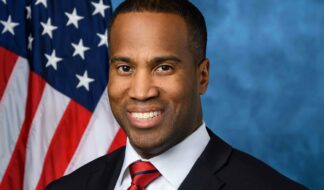Aimee Stephens has been on my mind a lot recently.
I thought about her when President Joe Biden, on his first day in office, issued a sweeping executive order targeting discrimination based on gender identity or sexual orientation. And I thought about her often while working on a legal brief supporting the rights of LGBTQ+ people in a pivotal case now before the Michigan Supreme Court.
Both Biden's order and the court case – Rouch World LLC v. Michigan Department of Civil Rights – are directly related to last year's Supreme Court victory involving Ms. Stephens, who was fired from her job at a Michigan funeral home after she came out as a transgender woman. Her case and two others, collectively referred to Bostock v. Clayton County, Georgia, ended with the high court etching into law the principle that every member of the LGBTQ+ community in America is protected from discrimination.
It is a seminal decision that Ms. Stephens, sadly, didn't live to see. She died of kidney disease less than a month before the court issued its historic ruling. Though she's sorely missed, there is comfort in knowing her legacy is already generating far-reaching change, with much more, hopefully, to follow.
President Biden cited Bostock as part of the legal foundation underpinning of his executive order, which stated:
"Every person should be treated with respect and dignity and should be able to live without fear, no matter who they are or whom they love."
After enduring – and helping fight against – four years of relentless attacks on the LGBTQ+ community from the previous administration, reading those words from our new president made my heart soar.
The changes resulting from that order will have a vast impact.
Alphonso David, president of the Human Rights Campaign, described the order's effect this way:
"By fully implementing the Supreme Court's historic ruling in Bostock, the federal government will enforce federal law to protect LGBTQ+ people from discrimination in employment, health care, housing, and education, and other key areas of life. While detailed implementation across the federal government will take time, this Executive Order will begin to immediately change the lives of the millions of LGBTQ people seeking to be treated equally under the law."
Mr. David added that the action is "the most substantive, wide-ranging executive order concerning sexual orientation and gender identity ever issued by a United States president."
Aimee Stephens helped make that possible.
The Bostock decision also plays a prominent role in the Rouch World case, which involves two businesses: Rouch World, which rents out its property in Sturgis for weddings and other gatherings, and Uprooted Electrolysis in Marquette.
After Rouch World refused to let a lesbian couple use its facility for their wedding, and Uprooted Electrolysis refused to provide electrolysis services to a transgender woman, both aggrieved parties filed complaints with the Michigan Department of Civil Rights, alleging sex discrimination in a public accommodation. The businesses then sued MDCR in the Michigan Court of Claims, arguing that MDCR could not investigate them because LGBTQ+ people are not protected against discrimination under current Michigan civil rights laws.
The Court of Claims correctly held that, because of the Bostock decision, transgender people are protected under our civil rights laws. However, when it came to the issue of sexual orientation, the court held that it was constrained by a 1998 Michigan Court of Appeals decision, Barbour v. Department of Social Services, which held that gay and lesbian people were not protected under our civil rights laws. But the legal rationale in the Barbour decision is outdated; Bostock should now take precedence. Based on that, MDCR is asking the Michigan Supreme Court to overturn Barbour and hold that gay and lesbian people are protected against discrimination under the category of sex in Michigan's current civil rights laws.
In short, the Michigan Supreme Court is in a position to address the question of whether Michigan's Elliott-Larsen Civil Rights Act includes protections against discrimination based on sexual orientation.
In a case that is being closely watched nationally, a coalition of advocacy groups weighed in on the side of the MDCR, filing a detailed "friend of the court" brief supporting the state's case. Signing on to that brief is a large number of Michigan groups including the ACLU of Michigan, Affirmations, Equality Michigan, LGBT Detroit, Trans Sistas of Color, Stand with Trans, Out Front Kalamazoo and Out Center of Southwest Michigan. Also signing on are national groups, such as the national ACLU, Human Rights Campaign, National Center for Lesbian Rights, Freedom for All Americans, and the Southern Poverty Law Center.
We believe the law is clearly on the side of inclusion, and so we joined together to make the strongest argument possible when the Michigan Supreme Court considers Rouch World.
Recently, the Equality Act, a federal bill that would provide the first explicit civil rights protections for sexual orientation and gender identity in employment, housing, education, and public accommodations, was reintroduced and passed the U.S. House of Representatives. It now moves to the Senate. In addition, legislation has been introduced in the Michigan legislature to amend our civil rights laws to explicitly mention sexual orientation and gender identity. This is in addition to Fair and Equal Michigan's collection of petition signatures that would require the legislature to add these categories explicitly into the state's civil rights laws, or for Michigan voters to decide to do so in the November 2022 midterm elections.
Naturally, this question arises: Why do we need explicit mention of sexual orientation and gender identity in our federal and state civil rights laws, if courts are already finding that we are protected under existing civil rights laws that prohibit sex discrimination? The answer is that we can pursue LGBTQ+ equality through parallel tracks — the courts, the legislature, and even the ballot box. Until we are able to successfully persuade a majority of legislators and/or voters to do the right thing, we continue to rely on our courts to apply the Bostock decision to all contexts of discrimination against our community.
While the sex discrimination litigation provides solid legal protection, also having explicit protections spelled out in the law helps reduce any uncertainty or confusion. It means that people don't have to go to court to establish that LGBTQ+ discrimination protections exist in every instance where state law prohibits sex discrimination. It also sends a crystal-clear message to employers, landlords and businesses about what is prohibited, which helps establish norms of behavior to lessen overall discrimination so that fewer people even need to file complaints in the first place.
The crucial point is this: we need to guarantee beyond any doubt that state and federal civil rights laws provide LGBTQ+ people the same dignity and opportunities as everyone else.
The legacy of Aimee Stephens demands nothing less.










